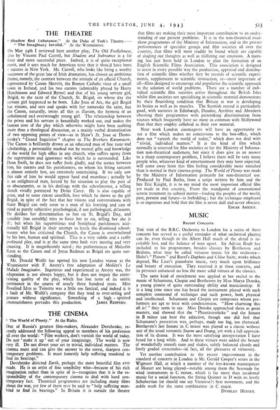" The World of Plenty." At the Rialto.
THE CINEMA
ONE of Russia's greatest film-makers, Alexander Dovzhenko, re- cently addressed the following appeal to members of his profession all over the world: " Film workers, don't varnish the world of today. Do not 'make it up' out of your imaginings. The world is now very ill. Do not divert your art to trivial, individual matters. The cinema must and can give the answer to the sorest, sharpest con- temporary problems. It must honestly help suffering mankind to find its bearings."
Dovzhenko directed Earth, perhaps the most beautiful film ever made. Hc. is an artist of fine sensibility who—because of his rich imagination rather than in spite of it—recognises that it is the re- sponsibility of the contemporary cinema to deal with hard con- temporary fact. Theatrical programmes are including ,many films about the war, yet few of them M3Y be said -to " help suffering man- kind to find its bearings." In Britain it is outside the theatre
that films are making their most important contribution to an under- standing of our present problems. It is in the non-theatrical road- show.progranunes of the Ministry of Information, and in the private performances of specialist groups and film societies all over the country, that films will most readily be found which are capable
of shaping our thoughts as well as titillating our emotions. A meet-
ing has just been held -in London to plan the formation of an English Scientific Films Association. This association is designed to assist in every possible way the production, appraisal and distribu- tion of scientific films whether they be records of scientific experi- ments, supplements to scientific instruction, or—most important of all—films designed to encourage acid popularise the scientific approach to the solution of world problems. There are a number of indi- vidual scientific film societies active throughout the British Isles whilst film societies not specialising in scientific material demonstrate by their flourishing condition that Britain at war is developing its brains as well as its muscles. The Scottish record is particularly good, with societies in Edinburgh, Dundee, Ayrshire and Aberdeen choosing their programmes with painstaking discrimination from sources which frequently have no more in common with Hollywood than that they employ celluloid as their raw material.
Next week London cinemagotis will have an opportunity to see a film which makes no concessions to the box-office, which does not " varnish the world of today," which does not deal with • " trivial, individual matters." It is the kind of film which normally is reserved for film societies or for the Ministry of Informa- tion non-theatrical audiences, but since it does give us an answer to a sharp contemporary problem, I believe there will be very many people who, whatever kind of entertainment they may have expected, will come away from this film feeling considerably more enriched than is normal in their cinema-going. The World of Plenty was made by the Ministry of Information primarily for non-theatrical use. Produced by Paul Rotha, from a script written by him and the late Eric Knight, it is to my mind the most important official film yet made in this country, From the standpoint of conventional screen treatment its subject matter—feeding the peoples of the world, past, present and future—is forbidding ; but the technique employed is so ingenious and bold that the film is never dull and never obscure.
EDGAR ANSTEY.


























 Previous page
Previous page